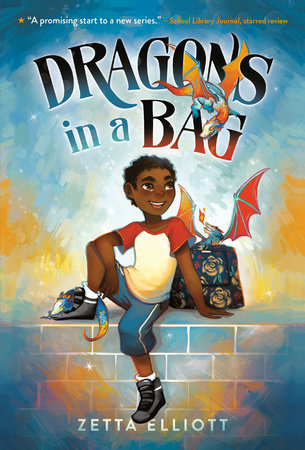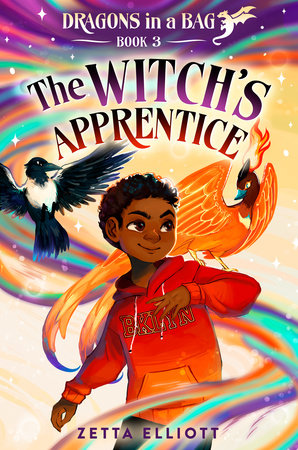Author Zetta Elliott Reflects on Her Banned Book
by Zetta Elliott
When an educator tagged me in a tweet last week, I wasn’t surprised. I’m not very active on social media, but the popularity of my bestselling urban fantasy series, Dragons in a Bag, has generated a steady stream of posts by parents and teachers eager to share young readers’ artwork or their own rave reviews. This particular tweet, however, was different. Instead of papier-mâché dragons, the attached image showed a spread from my 2020 picture book, A Place Inside of Me: A Poem to Heal the Heart. Above the illustration was the hashtag #BannedBooks.
I skimmed the rest of the tweet, clicked on the photo to see the original angry Facebook post, and decided to take no action. When I realized the same educator had also tagged me on Instagram, I ignored that post as well. I admit to being conflict-averse, but I also felt that one stranger waving a red flag on social media wasn’t an emergency that required my immediate attention. And I had no intention of pouring fuel on a fire that might sputter and die out if left alone.

It helps that A Place Inside of Me is covered in “book bling.” Debut illustrator Noa Denmon won the prestigious Caldecott Honor Award, and we received several other honors for our depiction of a Black boy’s emotional response to a police shooting in his community. Shiny stickers aren’t exactly armor, but they made it fairly easy for me to dismiss one elected official’s opinion that my book is “garbage.”
Then, a few days later, I got a Google alert with links to an article in the Richmond Times-Dispatch outlining the county supervisor’s objections to my book. I learned that A Place Inside of Me was challenged by a parent but kept in circulation at the school principal’s discretion. Dissatisfied with the decision, the parent turned to the supervisor for support, and the matter escalated. Within twenty-four hours, two residents of Mechanicsville, Virginia, contacted me to express their opposition to attempts to ban my book; one even requested permission to read the poem in its entirety at the next meeting of the Board of Supervisors. It was clear I wasn’t going to avoid controversy much longer, but the knowledge that the community was engaged in the debate reassured me.
We authors can and do defend our books, but protecting freedom of expression isn’t the responsibility of any individual or members of a particular profession. Communities have to embody the values they wish to pass on to their children. Sometimes the students themselves need to remind adults that the purpose of education is to invite — not prevent—the curiosity that can sometimes cause discomfort. Last fall, one of my other picture books, Milo’s Museum, was banned by the York District School Board in Pennsylvania. There was no specific objection to my book about a Black girl who opens her own museum to display the things that matter most to her; the school board simply restricted access to all titles on a resource list designed to help educators diversify their classroom collections. All the titles were by or about people of color. Students in York mobilized and successfully overturned the ban, but school districts across the country face similar challenges to books that center children and teens from marginalized groups.
In a recent op-ed for the New York Times, Pulitzer Prize-winning author Viet Thanh Nguyen argues that the people supporting censorship in schools “seem to want to circumscribe empathy, reserving it for a limited circle closer to the kind of people they perceive themselves to be.” The county supervisor in Virginia was offended by just two pages in A Place Inside of Me — the spread that shows the main character expressing anger and attending a protest rally. Apparently, it’s fine for Black children to experience joy, sorrow, fear, compassion, and hope. But rage — especially when caused by police misconduct — somehow puts them beyond the pale.

My book is dedicated to Zion, the young nephew of Atatiana Jefferson, a Black woman who was shot dead by a Fort Worth police officer while they were playing video games at home. Is Zion not entitled to feel any anger at this injustice? I wrote the poem that became an award-winning picture book twenty years ago when the memory of the 1999 police killing of unarmed African immigrant Amadou Diallo was still fresh in my mind. He was struck by 19 of the 41 shots fired by four plainclothes officers in NYC. Here in Chicago, the officer who in 2014 shot 17-year-old Laquan McDonald sixteen times — mostly while he was already on the ground — has just been released from prison after serving half of a seven-year sentence. When Minneapolis officer Derek Chauvin murdered George Floyd in 2020 by mercilessly kneeling on his neck for close to 10 minutes, the nation erupted with emotion — and protests spread around the world.
Children are not immune to social movements. Historically, they’ve been at the forefront of the struggle for civil rights — integrating public schools and lunch counters — and today, they register first-time voters and organize marches against gun violence and climate change since adults have failed to act. Shouldn’t the books they read in school reflect this reality?
When I sign copies of A Place Inside of Me, I urge young readers to honor all their emotions. No child should be shamed or punished for feeling the righteous rage that often leads to social change. Banning books like mine is a sad attempt to preserve the status quo in a world that’s ready to be transformed.
-
Books by the Author:
-
Dragons in a Bag
Also available from:The Dragon Thief
Also available from:The Witch's Apprentice
Also available from:



